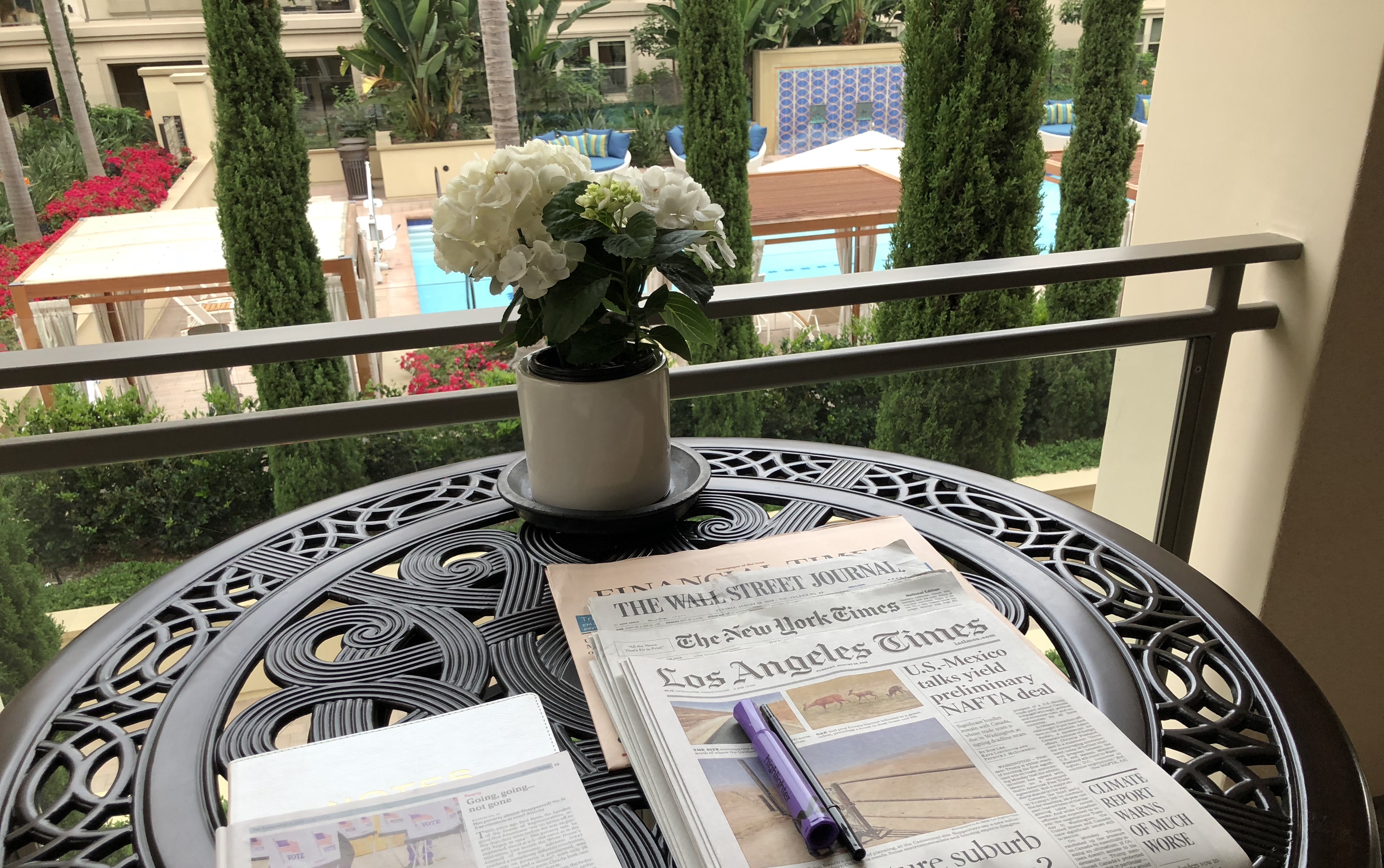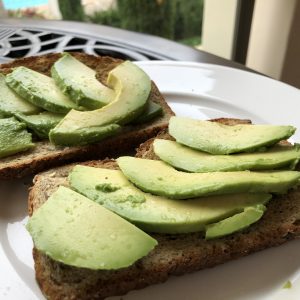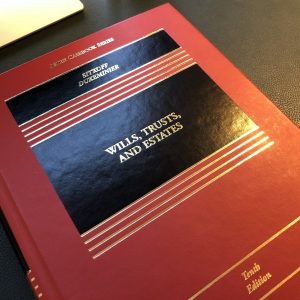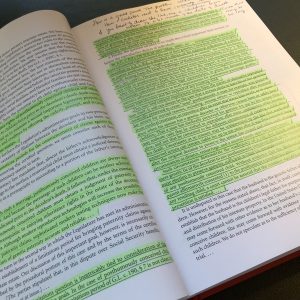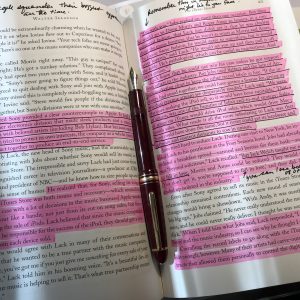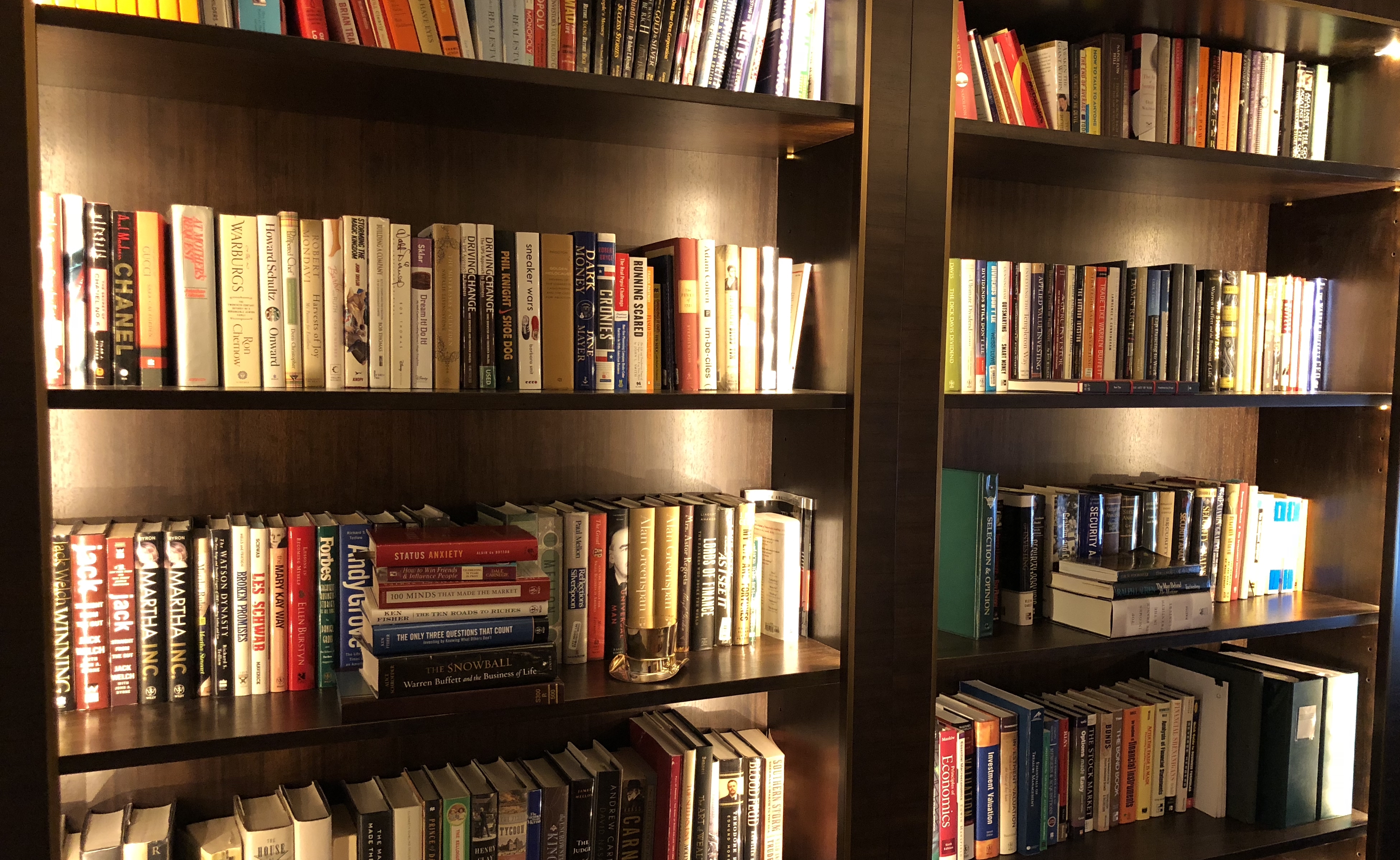The Biggest Advantage You Can Give Yourself In Life Is Reading
It is not an exaggeration to say that most of my life and career has been spent reading, writing, and thinking. In many cases, I turned around and taught others a synthesized version of what I absorbed, putting my own spin on it. My favorite place in the world during childhood was the public library and even now, I am typing this post surrounded by enormous bookcases overflowing with volumes on everything from trust fund structures to biographies of oil and banking titans. Reading allows me to satisfy a nearly insatiable curiosity about the world. More than any other behavior, it has been responsible for my success.
The reason is simple. When you read a book, it allows you to access the accumulated wisdom of other people. If you think of ideas like tools, you can survey their lives and careers, picking out what might be advantageous on your own journey. That is one of the reasons I have tried, over the past seventeen years, to share so much about our journey. If something Aaron and I experienced, or discovered, can help you get ahead faster or go further, we want that for you. We want to see you succeed. We want to help you avoid mistakes and setbacks.
The nurturing of our reading habit is not an accident. It is deliberate; purposeful. We fiercely protect our reading time, shutting out the world so we can focus. We also invest in it financially, making it a clear priority. Our research and publication budget reaches comfortably into the mid-five-figures per annum with newspapers, magazines, academic journals, trade journals, books, online database access, and nearly every other imaginable source of information showing up either in print or digital format like clockwork. We’re happy to write these checks because we want as few barriers between us and information as possible. If there is a topic either of us wishes to study, we want to be able to amass a cache of research on it then lock ourselves away as we pore over pages. This investment has been so fruitful because:
- It makes us more knowledgable about the world. We feel that, more often than not, it makes things visible to us much sooner than they are to the general public consciousness. By the time we are dealing with a situation that requires action, we’ve had the luxury of thinking about it without the pressure to do something in the heat of the moment.;
- A single good idea every year or two has the chance of resulting in financial payoffs that are highly satisfactory relative to the effort. You go along accumulating all of this aggregate data and then, suddenly, something happens with a specific company, industry, or country, and you already have the mental file built to understand how the relevant variables are related. It helps reduce risk. You study the chess board, make an occasional move, and, if you’ve behaved wisely, more often than not, get showered with rewards. (I say more often than not because, as Captain Picard observed, “… it is possible to commit no mistakes and still lose. That is not a weakness, that is life.” You need to arrange your financial affairs in a way that this inevitability does not wipe you out so that you can still come out ahead over time despite setbacks, even those that are deep and painful.) Just as importantly, you can get a better feel for certain risks that are lurking below the system; things that you might want to take measures against in the hope of mitigating the damage before the eruption.; and
- It supports journalistic, educational, and research institutions, which we believe are an integral part of any flourishing and free society. There is a reason that the press is referred to as “the Fourth Estate”, serving as a check on the executive, legislative, and judicial branches of the Federal and state governments. We want to help build a vibrant market in which intelligent people with an academic orientation can devote their lives to educating their fellow citizens, shining a spotlight on power or highlighting an interesting discovery.
Add to this the annual reports, 10-K filings, 20-F filings, government publications (e.g., data from the Federal Reserve, reports from Congressional sub-committees, court rulings, etc.), and I’m in proverbial heaven. I get to walk around thinking about the costs of heat resistant sleeves at coffee shops and the long-term risk of automated trucking decimating rural America even further given it remains one of the last, good, high-paying jobs available to blue collar workers; about bourbon shipments to Europe and hotel occupancy rates at theme parks; about the conflict between solvent governmental budgets, the need for immigration, and the rising tide of nationalism or the incredible boom, partly due to a weather-driven shortage of supply, that is happening in the vanilla bean industry with prices going from $50 per kilogram to more than $600 per kilogram over the past five years. At the core, it’s about people – what they value, how they act, what they really think and believe despite what they profess. To me, it’s a huge blessing and a source of endless fascination. There is nothing I would rather be doing with my time. There is no career I would rather have.
Another major component of this system, and a reason it works so well for us, is that we also set aside time to think. It’s not enough to absorb information. You need to sit with it, often alone, and mull it over for days, weeks, months, maybe even years. Try to understand the who, what, where, when, why, and how. Visualize and run scenarios. That introspection, turning the idea over like a cube in your hands as you try to go at it from all angles, is how things tie together.
The Importance of Structure and Ritual in Developing a Reading Program
In my own case, I’ve found that I do my best reading during certain periods of the day, including the first few hours after I’ve woken up, during which time I don’t want to speak to anyone. Now that we are settling down in Southern California, we’ve been adjusting our system so it works best for our new surroundings. While it will no doubt change as we perfect it, usually, it goes something like this …
First, Aaron makes breakfast along with a pot of black coffee in a French press for me and a glass of green tea for him. Monday through Friday, the breakfast consists of a low-calorie, high-protein mix of eggs, sausage, and vegetables plus an indulgence. In my case, I get one serving of sour cream (exactly 30 grams adding 60 calories) to make it more like an omelette, while he sometimes opts for fruit and/or a homemade latte. From time to time, we’ll add slices of fresh avocado on whole wheat toast. On Saturday, we combine breakfast and lunch into a single brunch and have freshly-made stacks of pancakes with syrup. He usually garnishes his with peanut butter and raspberries while I opt for blueberries and a few shakes of powdered sugar. (Yesterday was different because we opted for a razzleberry and strawberry compote, respectively.)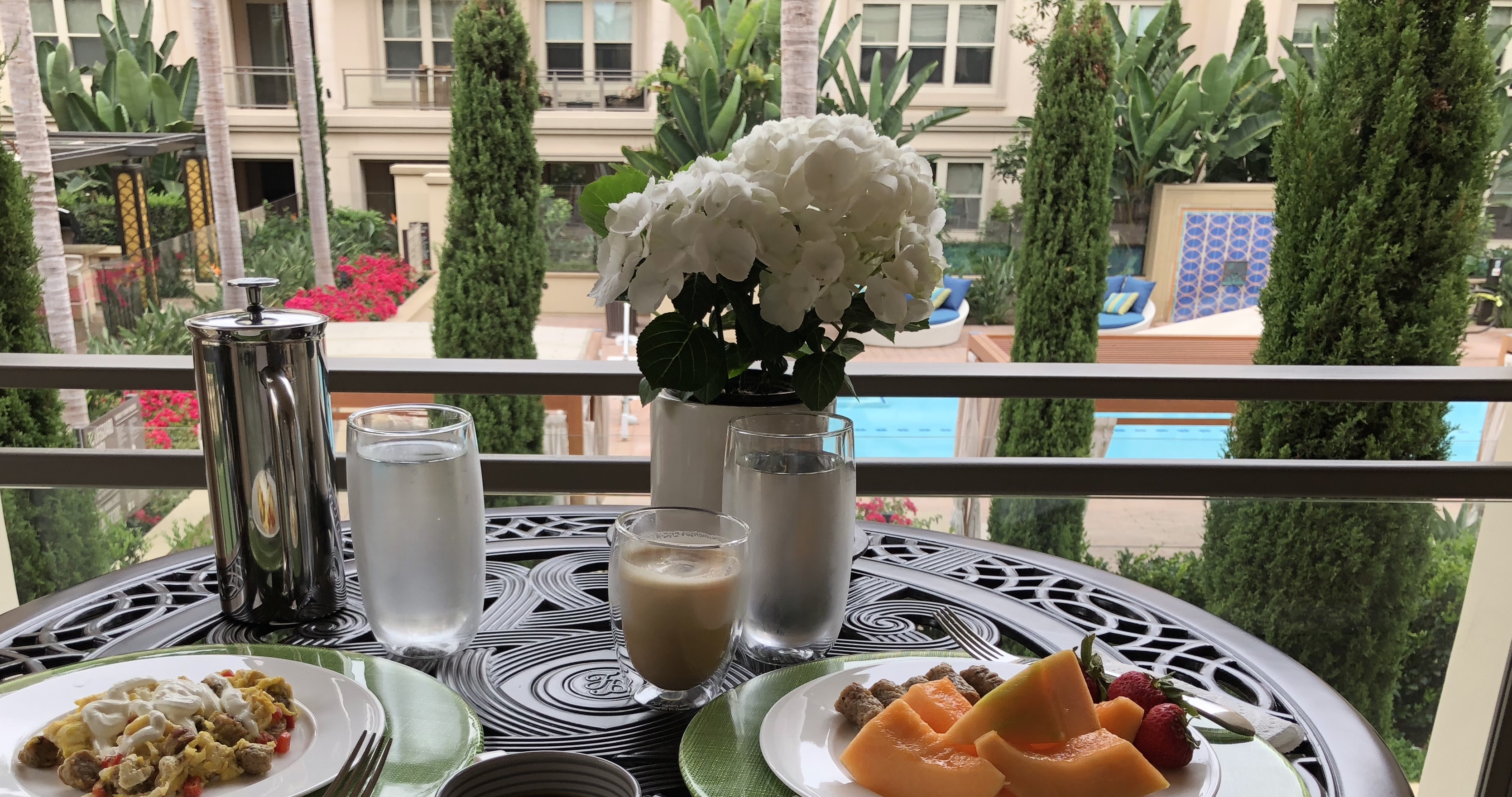
After we eat, we dive into five print newspapers (the reason we opt for print rather than digital is that we don’t want to be distracted by moving ads, links, comments, or anything else that diverts our attention):
- The New York Times;
- The Wall Street Journal;
- Financial Times;
- Los Angeles Times; and
- The Orange County Register.
After the physical print newspapers are read, we switch to several online newspaper subscriptions as the print editions aren’t available in Newport Beach, namely The Washington Post and The Times of London.
Finally, once that is done, there are several blogs and other online sources we check. These range the gamut from science blogs to political forums from the far-right and far-left of American politics, the latter as a way to keep track of special-interest topics. The digital reading happens on either a 12.9″ iPad Pros, Microsoft Surface Studio Pros, iMacs, a MacBook Pro, or MacBook Airs depending upon the day and where we want to physically sit as we’ll sometimes change locations for a difference in scenery. These specialty sources are important despite the fact that a major challenge in recent years is that the Internet has given people with no wisdom, no insight, and little knowledge the ability to go viral, dragging down the overall level of information and discourse. We’ve talked about this before – how open-source, lightly moderated communities end up diluting the story down to what is then the conventional understanding of a topic, often over-simplifying it in the process to the point it becomes dangerous.
The biggest difference on the weekends is that the reading routine tends to change. Usually, we add other publications to the mix such as Barron’s and The Economist but there is no telling ahead of time of what the list will look like; Fortune, Forbes, The Atlantic, Harvard Business Review, MIT Technology Review, Democracy: A Journal of Ideas, The Cato Journal, Worth, American Affairs, National Affairs … again, right-wing, left-wing, capitalist, socialist, scientific, managerial, the goal is to find a kernel of usable information to build a better life, better business, and better portfolio one decision at a time; to end the day a little wiser, and a little richer, than we were when we got out of bed (or, in the case of the latter, it tends to be we plant seeds that have payoffs that sometimes arrive years down the road with little to no warning as you can’t predict when something might come in handy).
The Purpose of Our Early Morning Reading
The purpose of this morning reading ritual is similar to a military drone flying in the stratosphere and searching for patterns or potential targets. It’s the high-level stuff. Sometimes, I’ll scribble quick scratch notes about stories I want to discuss with Aaron or things I’d like to further research. It’s much less selective in terms of potential data sources than the more serious reading that occurs in the afternoon and evenings. Due to that fact, it requires a different approach. By definition, it is a broad brush. We go into it with the philosophy of John Stuart Mill, drudging through a lot of volume “seeing that no scattered particle of important truth are buried and lost in the ruins of exploded error”. This sometimes requires a certain level of distance and control that is a by-product of experience and training as it certainly doesn’t come naturally. The key is to approach the texts as if you were a prosecutor looking for logical fallacies or gaps in understanding based on other knowledge you know to be accurate. You must not treat the publications as authorities themselves but, rather, as a starting point in your investigation; a nexus that might lead to interesting case studies down the road for which you will need to get to the underlying sources, removing as many layers from you and the data as possible so you can better evaluate what is really happening.
That said, even I occasionally find myself trying not to roll my eyes when a particular piece crosses the point at which I have a hard time viewing it through a dispassionate lens. Attempting to read modern protectionists defend thoroughly discredited economic policies after those policies managed to rise from the political dead like the reoccurring plague they are – this time, causing their adherents to self-identify as Republicans rather than Democrats – usually does it. It’s like reading people advocating for infecting the world with fiscal Ebola. The ignorance is almost incomprehensible. So is the self-delusion. These folks display mental gymnastics that are so adroit it is a wonder they are able to function in the real world rather than collapse under the weight of their cognitive dissonance. Their self-imagine doesn’t let them recognize the basic reality that, in demanding tariffs and subsidies, they are demanding 1.) welfare for themselves and 2.) a reduction in individual freedom from their fellow citizens. As a consumer, you – not the government – should have the freedom to choose what kind of sweater, furniture, clothing, car, or video game system you buy. This goes beyond economics and gets into political philosophy. Protectionism is a form of violence. Like many forms of violence, it ends up harming those who advocate for it. Expanding the power of the government to interfere in the lives and choices of individual citizens is not conservatism. It is evil. It is stupid. Ultimately, it leads to misery that is well-deserved. The problem is all of the innocent people that are harmed as collateral damage.
Likewise, certain members of the social right and social left demonstrate the “man with a hammer” syndrome all the time, seeing everything as a nail to be solved by doing their “one big thing”. For example, last week, I waded through the almost comical ignorance that called itself an essay in which a prominent Catholic author asserted that the “#MeToo” movement, and nearly every other imaginable social ill, was the result of the government’s failure to outlaw birth control; that before the birth control pill was invented, sexual harassment wasn’t like it is now because women weren’t objectified as sexual objects as men were perfect gentlemen who viewed ladies as people not merely potential sexual partners. That level of historical revisionism almost strikes me as brainwashing or mental illness; this idea that, again, all we need is Government with a big “G” expanding its power over our lives, stepping in by force, and restricting our individual freedoms for all to be made right with the world. That, by doing this, and subjecting ourselves to autocratic rule, we will somehow, someway, magically be restored to some glorified, golden past that anyone with any knowledge of history is well-aware never existed. Another illustration from yesterday afternoon: I had to stop myself from rolling my eyes as I read a far-left publication because the author referenced a quote from another writer who blamed her depression not on biology – she doesn’t believe doctors or therapists can help her – but on society because, in her view, society structurally creates her misery; that she cannot get out of bed (literally) and is “depressed because [she] live[s] in a White-supremacist, patriarchal, capitalist world”. There’s so much baggage to unpack there it isn’t even worth the time. The important thing to understand is that even if the author had been white, male, and rich, the odds are overwhelming she’d still be unhappy as her mental state comes through her writings; a profoundly broken person with significant mental health issues. She would do well to observe the words of Cassius who, when speaking with his friend, acknowledged, “[t]he fault, dear Brutus, is not in our stars, but in ourselves…”
Still, it’s worth the effort. That same conservative publication with the deranged obsession with taking away individual freedom by banning a woman’s right to choose for herself whether or not she should use birth control contained an insightful essay on different potential solutions for patent reform to spur innovation and entrepreneurship, leveling the playing field between multi-billion dollar technology and pharmaceutical giants and small inventors.
The Purpose of Our Late Morning and Early Afternoon Reading
During late morning and following lunch into the late afternoon, the reading tends to shift entirely. During these periods, it is often about individual businesses that matter to us and the private clients of Kennon-Green & Co.® – those businesses that are already owned, those we might want to own in the future, or those businesses that we think are somehow important or interesting for one reason or another. Here, we get into discussions about what we think an acceptable, conservatively-estimated intrinsic value figure is for a given security. We might go through the aforementioned annual reports, 10-K, and 20-F filings. We might read transcripts of earnings calls.
Usually, Aaron and I pursue our own reading agendas and only once we think a business is worth seriously considering do we then assign it to the other so we can circle back around and go over it together. In addition, we have institutional resources at our disposal that can make us more efficient. For example, we can search nearly all of the publicly traded security markets in the world to find companies that meet our criteria, including creating custom screens that adjust reported accounting figures for our own preferred metrics. Sometimes, we’ll go old school and I’ll sit in a comfortable chair and flip through the combined volumes of the Value Line Investment Survey editions, page by page, keeping notes on things that catch our attention. There’s no way to predict our day as so much of it is determined by the opportunities that cross our desks. This whole category falls into the “search the world for intelligent things to do” or “try and uncover problems that might make us want to rethink a position”. My personality tends to revolve around going down multi-day or multi-week themes. If I get interested in one candy company, I probably want to read about them all so I feel I have a good comparison of what is happening. If I find one pipeline potentially attractive, I want to know about the others.
One of my quirks is that I like to see the businesses I’m studying. If it’s time for a revisit of, say, McDonald’s Corporation, I’m probably going to want to go sit with the 10-K inside of McDonald’s as I work my way through the filing on a first-pass. It might look something like this (I’m grabbing an archived image from the blog that was uploaded years ago because it is easiest, it is no longer relevant, and you’ll get the idea) …
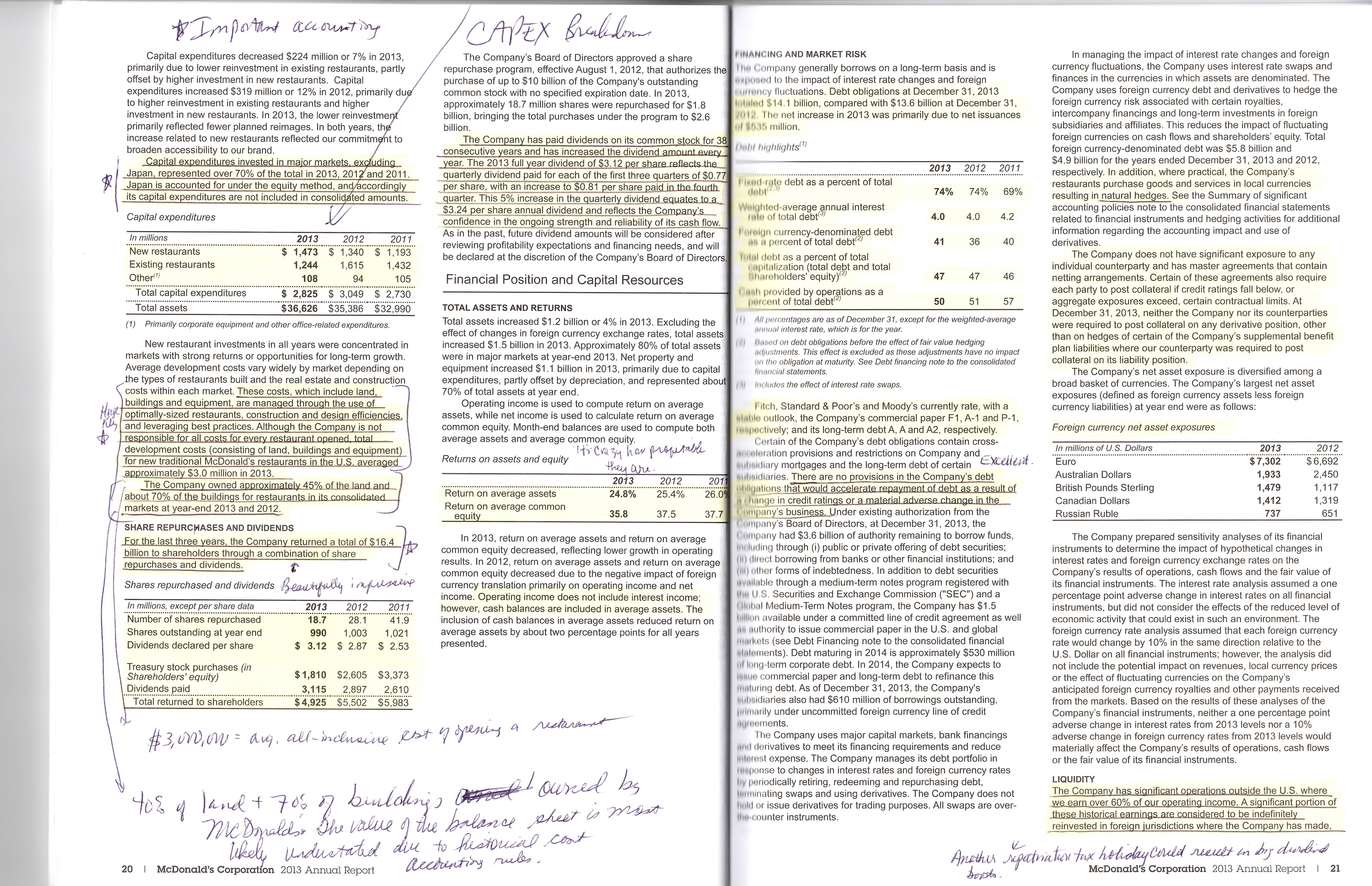
Other times, I’ll read and just have a scratch piece of paper to the side with most of it in my head.
The Purpose of Our Late Afternoon and Evening Reading
Usually, we deal with firm management and client servicing in the afternoon and evenings; phone calls, meetings, or other things related to the running of the asset management business. At some point, we’ll usually take another break either for lunch and/or a second walk. When the task list is done for the day, though, and the firm has been shut down for the evening, we go and have dinner, go the gym, and/or maybe get some other things done. Then, we usually settle into a routine of night reading depending upon how we feel and what we need to get done.
This reading is the sort of long-term, personal and business improvement kind that is meant to pay dividends far down the road in ways that might not be immediately apparent. For example, this is the time when I read biographies, history books, law reviews, white papers, textbooks, and similar works. Usually, this involves detailed case studies. Here, I try to take advantage of my passions and focus on whatever has captured my imagination at the moment even though I have a rough approximation of what the reading will look like for anywhere from 6 to 18 months ahead of time. To give one illustration, I’ve recently been acquiring a huge volume of books and papers that have long been out of print regarding the DuPont family fortune so I can map out exactly how the wealth and company structure arose. It astonishes me that people don’t even realize that this family – which has largely disappeared from the public imagination and many of whom no longer carry the last name DuPont as a result of marriage – has more than 3,500 heirs, some of whom are 7th and 8th generation, collectively living off of billions upon billions of dollars, much of which is held in trusts. Usually, the case studies lead to other case studies; e.g., when I was researching Ray Kroc and McDonald’s, it resulted in a potential list of more than 100 other family and corporate fortunes as I’ve never encountered a single entrepreneur or enterprise that allowed so many people, in so many different areas, to become self-made multi-millionaires either by working for him, franchising a restaurant, owning a supplier, or developing real estate. It’s astonishing. There is one privately-owned family firm in Chicago that most people don’t even know exists, yet between their Coca-Cola distribution rights and the supply business serving McDonald’s franchisees, the stockholders are billionaires. It’s like a real-world Agatha Christie novel, uncovering the connections and empires. (I truly mean it. One of the most valuable sources of case studies I’ve ever read in my life is McDonald’s: Behind the Arches, by John F. Love. Although it was published in 1995, and much of the information is now out of date, if you want to follow the trails of the individuals throughout its pages, you can uncover so much money its jaw-dropping. I could spend months writing posts detailing the strategies and empires built by people that are completely off the radar. I could use it as a textbook and teach a two-semester, back-to-back graduate level college course on strategy and/or finance.)
Right now, I am working my way through a copy of the 1,000+ page tome, Wills, Trusts, and Estates, Tenth Edition, by Sitkoff and Dukeminier. My motivation for reading it was three-fold.
- Personal entertainment. Although I am an asset manager, and not an estate attorney or tax accountant, trusts and estates are passion of mine; a dessert or hobby that brings me tremendous joy. (Back in 2014, you might remember we talked about them in certain posts; e.g., Is It Moral for Society to Protect Spendthrift Trust Assets from Tort Claims?, in which we got into the public policy aspects of asset protection.) It makes my pulse quicken and my imagination ignite as much as my beloved 한국 드라마. It’s the combination of the human element – not only the individual people involved but the economic and political history of how our laws and precedents came into existence – with the technical challenge of thinking about ways it might be possible to achieve a specific goal or objective through a given tool. It, too, is a great source of future case studies as it mentions multiple family fortunes that have fallen off the collective radar but that were once household names.
- With our relocation to Southern California and the fact we will be having kids through gestational surrogacy, we are going to need to completely overhaul our existing estate plans in ways that are different than if we had stayed in Missouri. For me, this includes thinking about putting in place some multi-generational trusts.
- Our firm manages millions upon millions of dollars in multi-generational wealth for other successful individuals and families. While our role is investing that capital, not structuring trusts given that we cannot, and do not, provide legal or tax advice (a disclaimer that is especially important because trusts involve state law so there are all kinds of unique considerations that vary on a case-by-case basis, often requiring multiple advisors – financial, legal, and tax – to coordinate together to achieve something for a private client), I feel like it is a moral, ethical, and professional duty to always be improving; to build on what I know and understand about the topic so that when we work with third-party, independent attorneys in an open architecture setup, there is already a database in my head; a shared language, and a basic understanding that allows me to meet what I feel are our fiduciary obligations.
The key here is I’m looking for accumulated wisdom I can put into my mental vault and pull out when I need it or it might be advantageous, potentially years or decades down the line. I don’t force myself to read anything, I ride the waves of my curiosity and passion so that it isn’t work. Usually, this ends with my books looking like this:
One of our major tasks in the coming weeks is going to be to figure out how to organize our library. As part of the move, Aaron and I have not only entire rooms filled with books and reference materials that we need to streamline, structure, and arrange in a way that is best for our productivity but multiple storage units, too. We are opening boxes, putting things on shelves, trying to group duplicates, and index everything. This will then allow us to keep only the most essential books on six bookcases that serve as our “core” collection, while moving everything else to one of the nearby storage units, which will have bookcases of their own. (The six bookcases that will hold our most essential reading are anchored to the walls to prevent them from toppling in the event of an earthquake. Each 48″ wide by 16″ deep by 90″ tall. Combined, I think they give us somewhere around 1,410+ linear inches of storage, or approximately 117.5 feet. We then fit them with the Philips Hue lighting system so we could run it as part of a smart home app. In the mornings, the lights gently come on like a sunrise until the house is lit, resulting in a much better experience. It also allows us to modify the color of the light to focus better depending on different conditions. Both of us are thrilled with the final product.)
I can only imagine how much more difficult this would have been if a few years ago, I didn’t start buying the bulk of my books on Kindle. The problem is that a lot of the really interesting works I need are out of print so I have to track down old copies that aren’t available digitally. There is a huge amount of wisdom in the world that cannot be found online or through an electronic device.
Your Reading System Should Reflect Your Goals, Objectives, and Personality (and a Couple of Recommendations)
For me, reading is not an obligation that I must force myself to complete. That’s the secret. I want to spend my time this way because I get a huge happiness boost from learning new things and finding ways to apply them for my own advantage as well as the advantage of people who rely upon me. I’ve arranged my life, career, and business this way so I can do what I love. The point is not to develop a reading system like mine but, rather, to create your own system that can help you level up in the areas that matter to you and your family. The texts you read should be valuable in that they add new information or put information you already know in a different light so you can better, and more thoroughly, process it. For example, trade magazines are enormously beneficial. If you run a restaurant or are somehow involved in food service, you should be reading QSR magazine. If you own a tire store, you should be reading Tire Review magazine.
While it is impossible for me to pick a single publication I like more than the others – each has its place and its role, the same way a knife and a spoon are useful in different ways – I will say that, generally speaking, I think everyone should subscribe to The Economist. If you read the physical copy cover-to-cover, and it is the only thing you read all week, you’re going to be immensely more knowledgable than you otherwise would have been. My biggest criticism of the publication is that it has an implicit bias in incorrectly assuming that economic growth, and greater financial prosperity, is the most important value people cherish. It’s a fairly large blind spot; not understanding that there are certain things people value more than wealth or theoretically optimal outcomes (which is a misnomer since the “optimal”, as they sometimes perceive it, does not include relevant variables to human happiness that cannot be measured in fiat currency). The newsstand price is $7.99 per weekly edition so you’ll want to subscribe to save money. At the moment, a Print + Digital subscription is only $190 per year, or $3.73 per week. If you pre-pay for three-years, it is only $455, dropping the cost to a $2.97 per week. It’s probably the best bargain in all of publishing.
I’m also a big fan of Harvard Business Review. Aside from being a fantastic general management magazine with in-depth articles for executives, the archives are an absolute gold-mine, containing 4,000+ essays by some of the most intelligent thinkers over the past few generations. That alone makes the $99 annual subscription price a great deal. If you don’t want to subscribe and browse the archives, you can shop the HBR store; e.g., it sells a $300 set of 14 books organized by topic, each filed with a curated list of HBR essays from over the decades.
Remember, though, that knowing isn’t enough. You have to take action; to do something with that knowledge that results in you finding a way to position yourself so that you add value to the world and, in exchange, people shower you with money. As General George S. Patton famously remarked, “A good plan violently executed now is better than a perfect plan executed next week.” Here, it ties back to the two lever philosophy – that there are only two ways you can increase your net worth. The first is to do something that results in more cash flowing into the coffers. The second is to do something that results in less cash flowing out of the coffers. In running, and owning, a business, the difference between those two figures, as well as the total capital employed to achieve them, is what determines the economic attractiveness of your enterprise.
What Are Your Favorite Reading Sources?
What is your favorite publication or blog? What book, periodical, or other source do you find valuable in living a better life or running a more successful business? I’m always searching to expand my list so if you have a suggestion, I’d love to hear it! Please share in the comments section!



